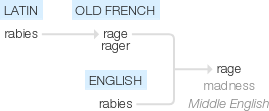Rage
Middle English (also in the sense ‘madness’): from Old French rage (noun), rager (verb), from a variant of Latin rabies (see rabies).
wiktionary
From Middle English, borrowed through Anglo-Norman rage (French rage), from Vulgar Latin *rabia, from Latin rabiēs(“anger, fury”).
etymonline
rage (n.)
c. 1300, "madness, insanity; fit of frenzy; rashness, foolhardiness, intense or violent emotion, anger, wrath; fierceness in battle; violence" (of storms, fire, etc.), from Old French rage, raige "spirit, passion, rage, fury, madness" (11c.), from Medieval Latin rabia, from Latin rabies "madness, rage, fury," related to rabere "be mad, rave" (compare rabies, which originally had this sense). This is said by some sources to be from PIE *rebh- "violent, impetuous" (source also of Old English rabbian "to rage"), but de Vaan finds this uncertain and sees no convincing etymology.
Similarly, Welsh (cynddaredd) and Breton (kounnar) words for "rage, fury" originally meant "hydrophobia" and are compounds based on the word for "dog" (Welsh ci, plural cwn; Breton ki).
It is attested from late 14c. in the sense of "fit of carnal lust or sexual desire." In 15c.-16c. it also could mean "rabies." Other Middle English senses, now obsolete, include "come to a boil; grieve, mourn, lament; flirt, make love." The rage "fashion, vogue" dates from 1785.
rage (v.)
mid-13c., ragen, "to play, romp," from rage (n.). Original sense now obsolete. Meanings "be furious; speak passionately; go mad" are attested from early 14c. Of things "be violently driven or agitated," from 1530s. Related: Raged; raging.
